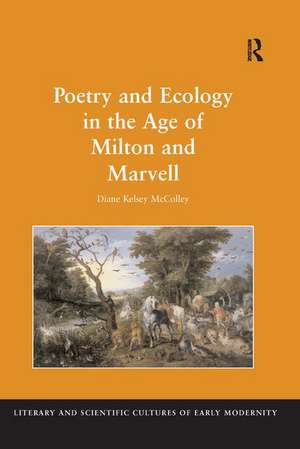Poetry and Ecology in the Age of Milton and Marvell: Literary and Scientific Cultures of Early Modernity
Autor Diane Kelsey McColleyen Limba Engleză Paperback – 14 oct 2016
| Toate formatele și edițiile | Preț | Express |
|---|---|---|
| Paperback (1) | 324.84 lei 6-8 săpt. | |
| Taylor & Francis – 14 oct 2016 | 324.84 lei 6-8 săpt. | |
| Hardback (1) | 823.91 lei 6-8 săpt. | |
| Taylor & Francis – 28 oct 2007 | 823.91 lei 6-8 săpt. |
Din seria Literary and Scientific Cultures of Early Modernity
- 23%
 Preț: 322.12 lei
Preț: 322.12 lei - 16%
 Preț: 338.06 lei
Preț: 338.06 lei - 26%
 Preț: 822.01 lei
Preț: 822.01 lei -
 Preț: 469.34 lei
Preț: 469.34 lei -
 Preț: 469.34 lei
Preț: 469.34 lei - 18%
 Preț: 1120.23 lei
Preț: 1120.23 lei - 16%
 Preț: 260.73 lei
Preț: 260.73 lei -
 Preț: 469.34 lei
Preț: 469.34 lei -
 Preț: 489.26 lei
Preț: 489.26 lei - 13%
 Preț: 309.88 lei
Preț: 309.88 lei -
 Preț: 489.26 lei
Preț: 489.26 lei -
 Preț: 489.26 lei
Preț: 489.26 lei -
 Preț: 389.38 lei
Preț: 389.38 lei - 31%
 Preț: 764.45 lei
Preț: 764.45 lei - 26%
 Preț: 765.59 lei
Preț: 765.59 lei - 26%
 Preț: 792.44 lei
Preț: 792.44 lei
Preț: 324.84 lei
Preț vechi: 432.44 lei
-25% Nou
Puncte Express: 487
Preț estimativ în valută:
62.16€ • 64.90$ • 51.44£
62.16€ • 64.90$ • 51.44£
Carte tipărită la comandă
Livrare economică 04-18 aprilie
Preluare comenzi: 021 569.72.76
Specificații
ISBN-13: 9781138252745
ISBN-10: 1138252743
Pagini: 276
Dimensiuni: 156 x 234 x 25 mm
Greutate: 0.49 kg
Ediția:1
Editura: Taylor & Francis
Colecția Routledge
Seria Literary and Scientific Cultures of Early Modernity
Locul publicării:Oxford, United Kingdom
ISBN-10: 1138252743
Pagini: 276
Dimensiuni: 156 x 234 x 25 mm
Greutate: 0.49 kg
Ediția:1
Editura: Taylor & Francis
Colecția Routledge
Seria Literary and Scientific Cultures of Early Modernity
Locul publicării:Oxford, United Kingdom
Cuprins
Contents: Preface; Introduction: the state of nature and the problem of language; Perceiving habitats: Marvell and the language of sensuous reciprocity; Earth, mining, monotheism and mountain theology; Air, water, woods; Hylozoic poetry: the lives of plants; Zoic poetry: animals, ornithology, and the ethics of empathy; Animal ethics and radical justice; Milton's prophetic epics; Bibliography; Index.
Recenzii
Prize: A Choice Outstanding Academic Title for 2008 James Holly Hanford Award of the Milton Society of America for the distinguished book of 2007 'Startlingly comprehensive, this work makes clear that air pollution, deforestation, wetland loss, radical changes in land use, animal rights, and a host of similar issues were surprisingly timely ones in the seventeenth century, routinely making their appearance in the literature of the day. This eye-opening, beautifully written book is absolutely essential for anyone interested in the literary history of the natural world.' Ken Hiltner, author of Milton and Ecology ’... a spectacular ecocritical analysis of 17th-century English poetry... Highly recommended.’ Choice ’... readers will no doubt be rewarded by McColley’s insights into early-modern sensibilities that commune with nature.’ Seventeenth-Century News ’A deep love of poetry animates McColley's writing, and reading her fascinating research into early modern science, philosophy and religion comes with the pleasure of her celebrations of language and nature. Such enthusiasms are so rare in academic criticism, which so often reads more like dead matter than vital spirit.’ Renaissance Quarterly ’McColley's study is as useful as it is inspiring ... includes brilliant illustrations and an index to enhance the learning experience ...’ Sixteenth Century Journal
Notă biografică
Diane Kelsey McColley is Professor II Emeritus at Rutgers, The State University of New Jersey, Camden, USA. She is the author of Milton's Eve; A Gust for Paradise: Milton's Eden and the Visual Arts; and Poetry and Music in Seventeenth-Century England.
Descriere
The focus of this study is the perception of nature in the language of poetry and the languages of natural philosophy, technology, theology, and global exploration, primarily in seventeenth-century England. Its premise is that language and the perception of nature vitally affect each other and that seventeenth-century poets-including John Milton, Andrew Marvell, Henry Vaughan, Margaret Cavendish, and Anne Finch among others-responded to experimental proto-science and new technology in ways that we now call "ecological".
